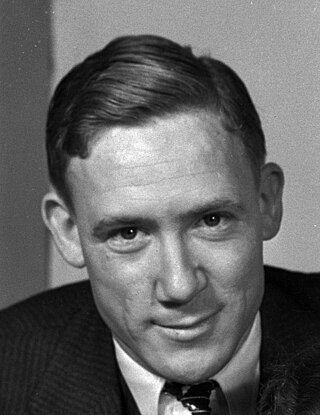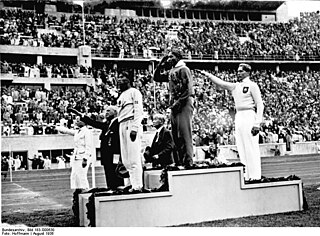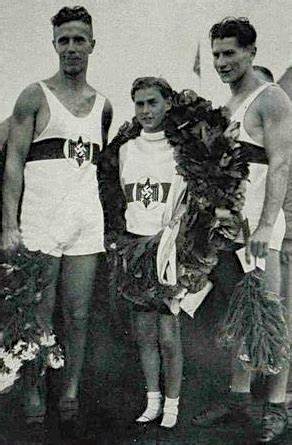
The 1936 Summer Olympics, officially the Games of the XI Olympiad and officially branded as Berlin 1936, was an international multi-sport event held from 1 to 16 August 1936 in Berlin, Germany. Berlin won the bid to host the Games over Barcelona at the 29th IOC Session on 26 April 1931. The 1936 Games marked the second and most recent time the International Olympic Committee gathered to vote in a city that was bidding to host those Games. Later rule modifications forbade cities hosting the bid vote from being awarded the games.

The 1972 Summer Olympics, officially known as the Games of the XX Olympiad and officially branded as Munich 1972, were an international multi-sport event held in Munich, West Germany, from 26 August to 11 September 1972.

Foy Draper was an American track and field athlete who won a gold medal in 4 × 100 m relay at the 1936 Summer Olympics. As a University of Southern California student, Draper won the IC4A championships in 200 m in 1935.

Carl Ludwig "Luz" Long was a German Olympic long jumper who won the silver medal in the event at the 1936 Summer Olympics in Berlin and had a friendship with Jesse Owens, who won the gold medal in that event. Luz Long won the German long jump championship six times: in 1933, 1934, 1936, 1937, 1938, and 1939.

Akilles "Aki" Eero Johannes Järvinen was a Finnish decathlete. He competed at the 1928, 1932 and 1936 Olympics and won two silver medals, in 1928 and 1932; he served as the Finnish flag bearer at all three games. He also won a European silver medal in the 400 m hurdles in 1934.

Germany was the host nation and top medal recipient at the 1936 Summer Olympics in Berlin. 433 competitors, 389 men and 44 women, took part in 143 events in 22 sports.
Helmut Hamann was a German athlete from Berlin who competed mainly in the 400 metres.

Wilhelm Leichum was a German athlete who competed mainly in the long jump and 100 metres.
Rudolf Lippert was a German horse rider who competed in the 1936 Summer Olympics. He was also a recipient of the Knight's Cross of the Iron Cross during World War II.
Johann Adolf Friedrich Maier was a German rower who competed in three Olympic games from 1928 to 1936. In Los Angeles, he won a silver medal, along with Karl Aletter, Walter Flinsch and Ernst Gaber in the coxless four. In Berlin, he won a gold medal, along with Paul Söllner, Walter Volle, Fritz Bauer and Ernst Gaber in the coxed four. He was killed during World War II while serving in North Africa. Gustav Maier was his elder brother with whom he had competed in the 1928 Olympics.
Josef Miner was a German boxer who competed in the 1936 Summer Olympics. In 1936 he won the bronze medal in the featherweight class after winning the third-place bout versus Hungary's Dezső Frigyes.
Paul Wevers was a German sprint canoeist, born in Cologne, who competed in the late 1930s. He won a gold medal in the K-2 10000 m event at the 1936 Summer Olympics in Berlin.
István Pelle was a Hungarian gymnast and Olympic champion.

Herbert Adamski was a German rower from Berlin who competed in the 1936 Summer Olympics.

Nikolaus Anton "Toni" Merkens was a racing cyclist from Germany and Olympic champion. He represented his native country at the 1936 Summer Olympics in Berlin, where he won the gold medal in the men's 1000 meter match sprint event.
Gerhard Seibold was an Austrian sprint canoeist who competed from the late 1960s to the early 1970s. Competing in two Summer Olympics, he won a bronze in the K-2 1000 m event at Mexico City in 1968.
Marten von Barnekow was a German equestrian and Olympic champion. He won a gold medal in show jumping with the German team at the 1936 Summer Olympics in Berlin.

Lejzor Ilia Szrajbman was a Jewish Polish Olympic freestyle swimmer. In 1935, he was the Polish 400m freestyle champion. He competed in the 1935 Maccabiah Games in Mandatory Palestine, and for Poland at the 1936 Summer Olympics in Berlin, Germany. In 1938, he won a gold medal in the Polish 4x200m relay freestyle championship. Szrajbman was murdered in 1943 in the Majdanek concentration camp.

Ernst Winter was a German artistic gymnast. He represented Eintracht Frankfurt gymnastics club.

The individual show jumping in equestrian at the 1936 Olympic Games in Berlin was held at the Olympiastadion (jumping) on 16 August. The competition was also referred to as the "Prix des Nations." There were 54 competitors from 18 nations, with each nation having a team of three riders. The results of the individual event were used for the team jumping event as well. The individual event was won by Kurt Hasse of Germany, the nation's first victory in individual jumping and first medal in the event since 1912. Romania and Hungary each earned their first individual jumping medals, the former with Henri Rang's silver and the latter with József von Platthy's bronze.











